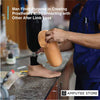5 Things People Living Their Normal Are Tired of Hearing
Society has long been biased in favor of the "able-bodied", causing many people to be insensitive or hypersensitive when reacting to others’ reality—whether the person is dealing with a visible or invisible disability.

Below are some of the things many people say that don’t do any good.
“I could never do what you do.”
While this might seem harmless, the person saying it intended their comment to come off as an act of commiseration. They want to show the other person that if misery loves company, they are willingly giving theirs.
However, there is a massive problem with this. This statement assumes that people with disabilities are living a miserable life, which is not the case.
Furthermore, if the person receiving the message is genuinely feeling down, such a statement conveys that their situation is the other person’s worst-case scenario. For people dealing with mental health issues, this would only exacerbate the problem.
Unfortunately, being self-aware is not a strong suit of many. In situations like this, it's best to try to understand how someone lives their lives.
“How do you have sex?”
Unless they intend to make a romantic connection, another person’s intimate life is not their business. Even when they're interested, such a statement can only come off as an offensive pick-up line.
“I wish there was a cure.”
A lot of well-meaning people utter this statement to convey empathy. However, for those who are okay with their situation, this statement can suggest that their "normal" makes them incomplete. A lot of people are born with what non-disabled people see as "disabilities", which are already a part of someone's identity.
“My friend, who also wears a prosthetic leg, walks without a problem…”
This statement can stem from a person’s desire to offer help or make conversation. However, it only shows a level of ignorance. Depending on the nature of the relationship of both parties, such unsolicited comments can come off as insensitive. Two people wearing the same type of prosthetic leg components can have two completely different experiences.
“You don’t look disabled.”
It's common to meet prosthesis wearers that don't appear to be in pain or having a hard time. Because of this, it's easy for others to judge and assume that living with limb loss is easy. This can be especially triggering for someone who has difficulty adjusting to his/her new lifestyle but is doing his/her best to remain positive.
This statement can also be problematic for people living with vision or hearing loss, diabetes, HIV/AIDS, and mental health issues (i.e., bipolar disorder, anxiety, depression, and schizophrenia), among others. While some people only intend to offer a compliment, this statement comes off as talking down to someone.
Cultivate sensitivity
Everyone wishes to be treated with kindness and respect regardless of their "normal". Together we must educate the public and teach self-awareness because, unfortunately, the drive to understand other people and to recalibrate one's attitude and responses to them is not always learned early in life.
Let us know your thoughts about this article in the comments section below.









































































